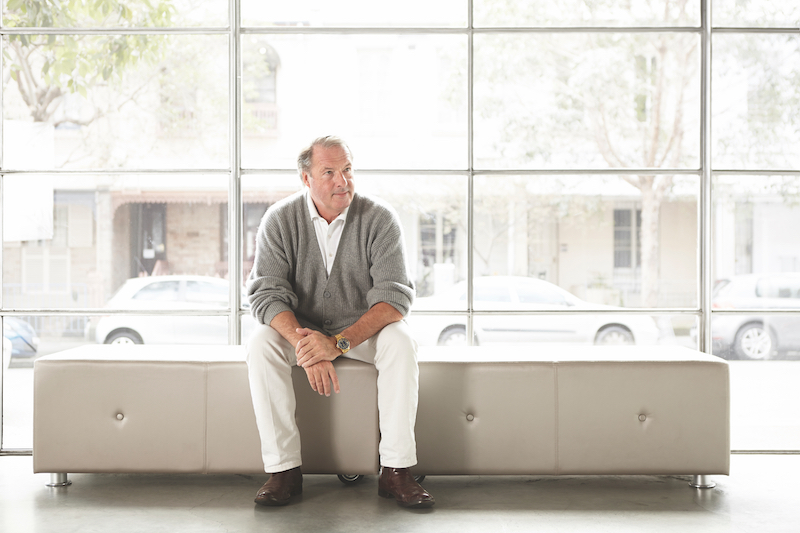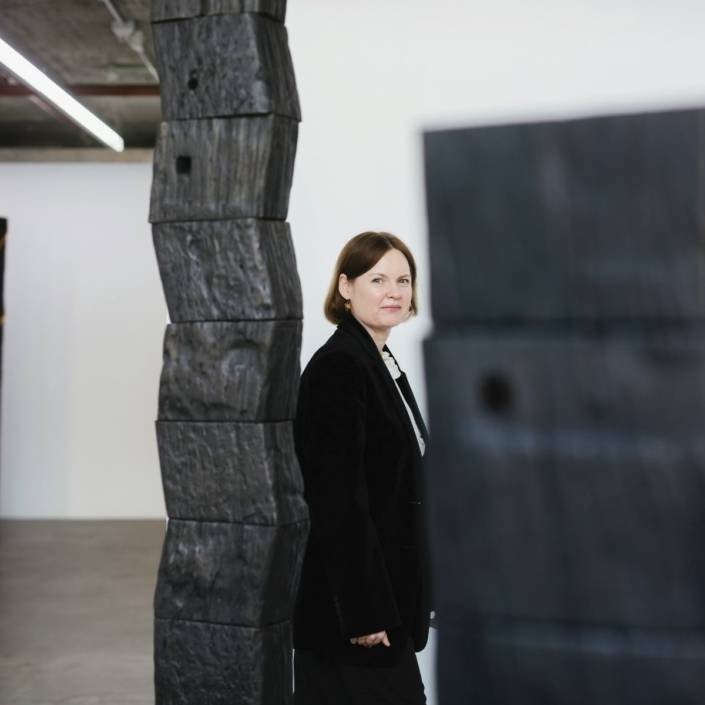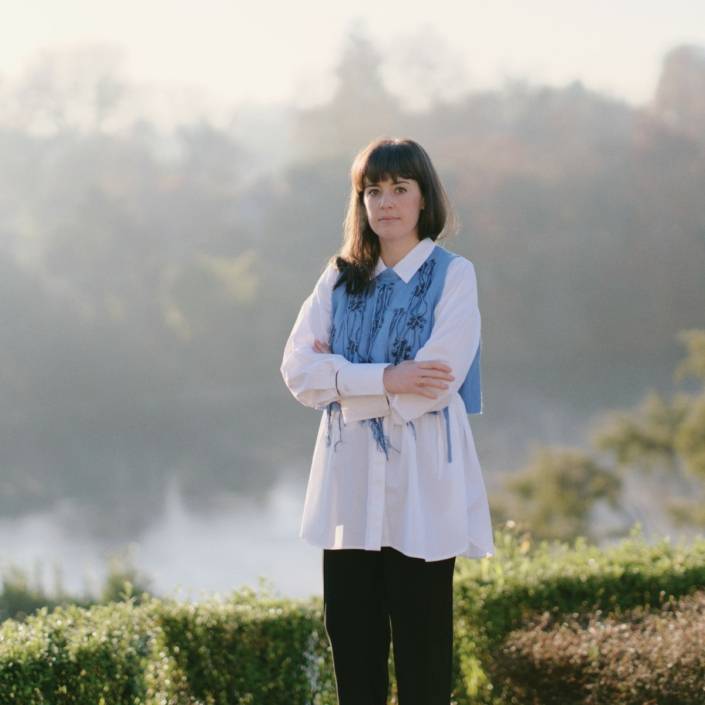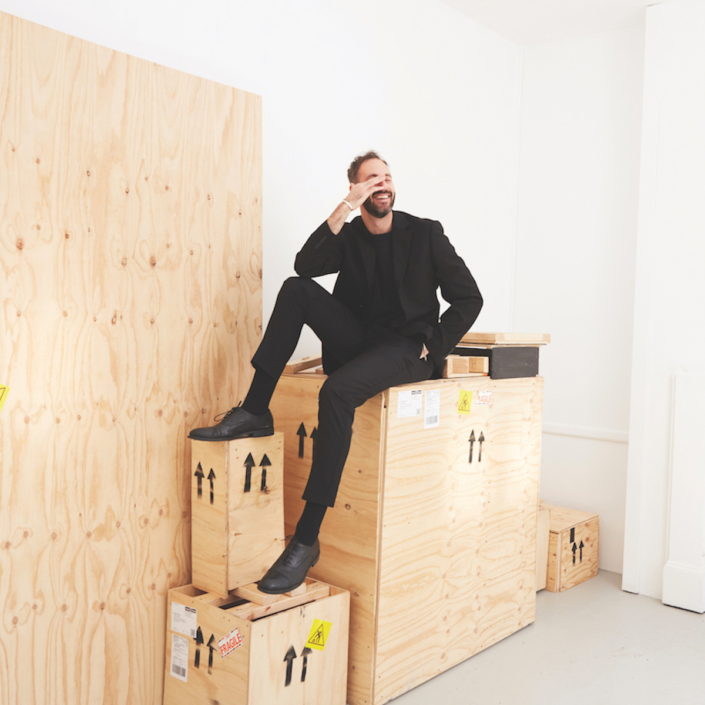James Erskine: Kicking Goals
James Erskine became an accidental gallerist when he had to decide what to do with a large space underneath the premises of his thriving sports management business.
Words: Helen McKenzie
Photography: Zan Wimberley
“The Gallery was a complete mistake” says James Erskine, referring to Liverpool Street Gallery in Sydney. He has my attention and I am on standby for the telling of a tale that will both amuse and inform. Decades in the sports and entertainment business have fine tuned Erskine’s raconteur abilities and his delivery echoes English comedians from Dave Allen to Ben Elton.
The self-confessed sports nut and mad art collector, who was born in Southport, Lancashire, would have it that he only went ahead with the building of Liverpool Street Gallery to save his high profile clients and himself from foody aromas wafting upstairs into his offices. “We bought a building for my sports and entertainment business SEL because I got fed up with paying rent for a very posh office down at Circular Quay, where I worked out that I probably looked at the Opera House for about 20 minutes a year.”
The development gave Erskine offices and left a space on street level that his partners assumed would house a restaurant. Erskine says: “I did not want Michael Parkinson, Zara Phillips or Shane Warne meeting upstairs, with smells of curry wafting up from some horrible restaurant downstairs – I actually hate curry but I don’t have anything against people who like curry. So I said we should have an art gallery down there, something prestigious, glitzy and they looked at me and said ‘if you are so bloody clever’ – actually, something slightly stronger than that – ‘why don’t you do it?’” Erskine did just that and the gallery has now been open for business since 2003.
Erskine’s interest in art was sparked around the age of nine by the work of L.S. Lowry. “Lowry painted scenes set in the north of England, of people trudging to work in factories,” he says. The works elicited two distinct responses in the young Erskine: “firstly, I didn’t want to do that for a living and secondly, I liked the art.” For his 21st birthday Erskine was offered a car as a gift from his grandfather. The then medical stduent, who was living in London at the time, told his grandfather that he had nowhere to park the proffered mini and wondered if he could instead have a Lowry painting? Erskine’s collecting life was already well underway.
Erskine’s medical student days came to a halt when he began working in sports management. His first big name clients were Nick Faldo and Bjorn Borg. Migrating to Australia in 1979 to run International Management Group’s Australian and Asian activities Erskine made Sydney home, ultimately setting up his own company Sports and Entertainment Limited with Tony Cochrane, Basil Scaffidi and David Coe in 1997. Erskine is known as an expert in television rights and individual management – the international broadcast of the Ian Thorpe interview with Michael Parkinson in July this year was managed by him.
Erskine says he thought that the establishment of a gallery and management of artists would call on his existing skills. “I was friendly with artists, I was a collector, I’d advised people, I’d done the odd show. Then when I had the space Dick Watkins, Kevin Connor, Peter Sharp, Karl Wiebke and Steven Harvey came to me. Because I manage sportsmen and TV people, stupidly I thought I could manage artists as well. Suddenly I had an art business and I knew nothing about it, but I learnt quite quickly.”
Erskine takes a multi-pronged approach to artist selection. He likes to look at the work from the art schools’ graduate shows and says he has never been afraid to ask questions and seek advice from both artists and gallery owners. “I ask people who I respect in the industry, [such as] gallery owners Ray Hughes [of Ray Hughes Gallery in Sydney], Bill Nuttall [of Niagra Galleries in Melbourne] and Frank Watters [of Watters Gallery in Sydney].” Artists Sharp and Harvey put Erskine on to Connor: “I saw his paintings and they were unbelievable and I said would you like to do a show? It happened. I’ve turned down a lot of successful artists because I didn’t like their art. Maybe I was wrong. I put in to Liverpool Street people that I like.”
Erskine has found that there are similarities between sports stars and artists. “Being an artist is like being an individual sportsman, not people playing a team game, more like being a golfer or a tennis player. There is an air of selfishness about people who do individual things and there is also an air of insecurity as well. If you’re an artist you are stuck in the studio and you are painting for a show, suddenly the day comes [and] it is like turning up on the first tee. Here’s your art. Are people going to like it? Buy it?”
Erskine recognizes that the gallery business has changed. “The foot traffic is less than it has been and I think that is sad because that is the way you learn and get a better eye – if you on a regular basis look at things, read things. Under a certain price point people are buying things on the Internet. People tend to go to art fairs rather than trudging the streets on Saturday looking at galleries.” Erskine says the gallery is not “a money making machine for me, I don’t think art is a money making machine. I’m very lucky I’ve got a day job. But it’s a business whichever way you hack it. We are a commercial gallery, at the end of the day it has to stand up on its own. It can’t be an extension of a millionaire throwing money away because it will never work that way.”
This article was originally published in Art Collector issue 70, OCT – DEC 2014.






